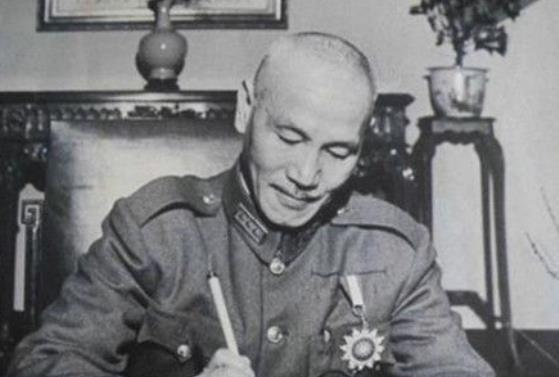On August 13, 1949, Long Yun and 44 other people jointly issued a telegram in Hong Kong, declaring an uprising. When Lao Jiang learned of this news, he summoned Mao Renfeng and scolded them, ordering him to immediately send spies to Hong Kong to assassinate these people, and repeatedly explained that He Yaozu must be eliminated.

So who is this He Yaozu? Why was Lao Jiang so angry after he declared the uprising? This was mainly because He Yaozu's seniority was too deep, he had served as the director of the attendant room of old Jiang and the commander of the military unification, and Dai Kasa could only be regarded as a younger brother in front of him.
The full name of the military command is the Bureau of Investigation and Statistics of the Military Commission of the National Government, which was established in August 1938. At that time, Dai Kasa was the deputy director, and the chief director was He Yaozu. He Yaozu was neither a graduate of Whampoa nor a fellow chiang, so why did he have the ability to pressure Dai Kasa to become the chief of the bureau? This is mainly because his seniority is too old.
He Yaozu joined the League in 1909 and was a veteran of the Kuomintang, when Dai Kasa was only a 12-year-old teenager; in addition, He Yaozu also followed Sun Yat-sen to participate in the Xinhai Revolution, the War of Yuan and the War of Defending the Law, and in 1926 he became the commander of the 40th Army of the National Revolutionary Army, when Dai Kasa had just been admitted to the Huangpu 6th Term.
In 1932, He Yaozu became the deputy chief of staff of the National Government, acting as the chief of staff, and Dai Kasa was only the director of the Special Branch of the Revival Society. In August 1938, the Military Command was established, and He Yaozu's position was Director of the General Office of the Kuomintang Military Commission and Director of the Military Command, with the rank of Lieutenant General; Dai Kasa was made Deputy Director with the rank of Colonel (promoted to Major General on March 8, 1945).
Through comparison, it is not difficult for us to find that regardless of seniority or position, Dai Kasa cannot be compared with He Yaozu, and he can only be a younger brother in front of him. So why did Old Jiang trust He Yaozu so much? In addition to seniority, there is also an important reason that He Yaozu was once the disciple of old Jiang.
In the spring of 1908, Lao Jiang went to Japan to study and entered the Zhenwu School in Tokyo, and a year later He Yaozu also came to this school and became Lao Jiang's disciple. During this period, the two joined the League. It was with this relationship that Old Jiang had a special trust in He Yaozu and repeatedly let him hold important positions.
So why did He Yaozu, who was deeply used by old Jiang, later embark on the road of opposing Chiang Kai-shek? This has a lot to do with his wife Ni Feijun. In 1932, under the introduction of Tang Shengzhi, Ni Feijun and He Yaozu met and married a year later. At that time, Ni Feijun was only 21 years old, and He Yaozu was 44 years old.
Although Ni Feijun was born in a landlord family, his thinking was very progressive, and after marriage, he participated in the anti-Japanese salvation movement many times, and became a secret party member under the influence of Xie Jueya. Soon after the Outbreak of the War of Resistance Against Japanese Aggression, He Yaozu became chairman of the Gansu Provincial Government and director of the Lanzhou Provincial Government, in charge of the military and political power in the northwest.
Under the influence of his wife Ni Feijun, He Yaozu's thinking also began to progress continuously, and during his tenure in Gansu, he instructed relevant personnel to rescue progressive young people detained by secret agents in many ways, issued passports and travel expenses to progressive people to Go to Yan'an, and sent guns, ammunition and medicine to the Eighth Route Army.
In the later period of the War of Resistance Against Japanese Aggression, Lao Jiang not only stopped paying the Eighth Route Army and the New Fourth Army, but also sent Hu Zongnan to lead heavy troops to blockade the Shaanxi-Gansu-Ningxia Border Region, causing difficulties in living in the border area and forcing him to carry out production to save himself. He Yaozu was very sympathetic to the situation of the Eighth Route Army, did his best to provide a lot of help to the Eighth Route Army, and persuaded Chiang Kai-shek to abandon the blockade of the border areas.
After the victory of the War of Resistance Against Japanese Aggression, the old Chiang Kai-shek actively planned a civil war, and He Yaozu was very dissatisfied with this, and resigned in anger, thus embarking on the anti-Chiang road. On August 13, 1949, He Yaozu, Long Yun, and others electrified an uprising in Hong Kong, and Lao Jiang was so angry that he immediately ordered Mao Renfeng to send agents to assassinate He Yaozu. But He Yaozu was prepared for this and arrived safely in Beijing under the prime minister's arrangement.
After the founding of the People's Republic of China, He Yao's ancestors served as a member of the Central South Military and Political Committee and minister of communications and the director of the counselor office of the Central South Administrative Committee, and died of illness in 1961 at the age of 73, and his ashes were buried in the Babaoshan Revolutionary Cemetery.